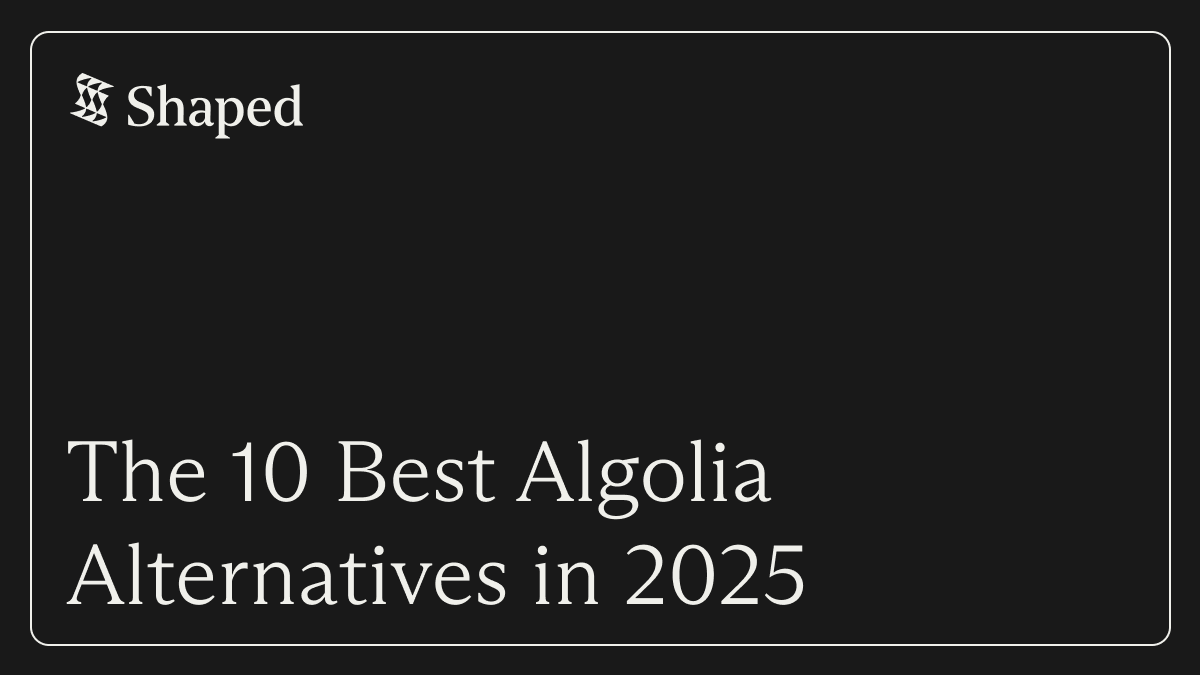1. Shaped
Shaped is an AI-native personalization and ranking platform that goes beyond simple search. Instead of just returning keyword matches, Shaped delivers personalized results tailored to each user — whether you are building a recommendation feed, a semantic search experience, or a “For You” page like TikTok.
Key strengths of Shaped as an Algolia alternative:
- Personalized ranking built-in. Unlike Algolia, which primarily returns keyword-based matches, Shaped ranks results per user, solving the “same results for everyone” problem.
- Cold-start solved. Shaped uses content embeddings and ranking models that don’t require massive behavioral histories, making it ideal for startups or new product launches.
- All-in-one API. You can handle search, recommendations, and feed ranking from the same interface, eliminating the need to stitch multiple tools together.
- Flexible objectives. Optimize for clicks, engagement, watch time, revenue, or any business KPI. Algolia doesn’t natively allow this type of ranking optimization.
- Fast integration. A few lines of code get you running — no large ML ops team required.
For teams that want search plus personalization, Shaped is a natural upgrade from Algolia. It provides modern AI-driven ranking, developer-friendly APIs, and flexible support for multiple use cases.
2. ElasticSearch
ElasticSearch is one of the most widely adopted open-source search engines. It is powerful and highly customizable, but it requires significant infrastructure management. Developers often choose it when they want full control over indexing and query logic.
- Strengths: Open source, large ecosystem, flexible data indexing.
- Weaknesses: Complex to operate at scale, lacks built-in personalization.
3. OpenSearch
OpenSearch is the open-source fork of Elastic maintained by AWS. It offers similar capabilities with community governance and a strong ecosystem.
- Strengths: Open-source alternative to Elastic, compatible tooling, strong for keyword search.
- Weaknesses: Requires DevOps investment, limited personalization or semantic search.
4. Meilisearch
Meilisearch is a lightweight, open-source search solution designed to be developer-friendly. It provides fast indexing and simple APIs.
- Strengths: Open source, easy to deploy, fast setup.
- Weaknesses: Limited advanced features, no built-in personalization.
5. Typesense
Typesense is another open-source search engine with a focus on simplicity and speed. It is commonly used by startups looking for an easy drop-in replacement for Algolia.
- Strengths: Simple APIs, good for small to mid-sized apps, open source.
- Weaknesses: Not as feature-rich as Algolia, lacks personalization.
6. Pinecone
Pinecone is a popular vector database that enables semantic search by storing embeddings and finding nearest neighbors. Many teams use Pinecone as a building block for retrieval-augmented generation (RAG) or search.
- Strengths: Strong semantic search infrastructure, cloud-native, well-documented APIs.
- Weaknesses: Only handles vector retrieval, no built-in personalization or ranking logic.
7. Weaviate
Weaviate is an open-source vector database designed for semantic search. It comes with integrations for machine learning models to generate embeddings.
- Strengths: Open source, modular design, good for experimentation.
- Weaknesses: Requires ops expertise, personalization features must be built manually.
8. Vespa
Vespa is an enterprise-grade search and recommendation engine built by Yahoo. It supports vector search and large-scale indexing.
- Strengths: Battle-tested at scale, combines structured and unstructured search.
- Weaknesses: Heavy to deploy, steep learning curve, enterprise-oriented.
9. Redis with Vector Search
Redis recently added vector search capabilities, making it possible to combine caching, real-time storage, and semantic retrieval in one system.
- Strengths: Familiar to many developers, fast, integrates with existing Redis setups.
- Weaknesses: Vector search is relatively new, not as advanced as dedicated providers.
10. Custom In-House ML Pipelines
Some companies still choose to build their own search and recommendation pipelines using libraries like FAISS or Annoy, combined with custom ML ranking models.
- Strengths: Maximum flexibility, fully customizable.
- Weaknesses: Very resource-intensive, requires ongoing ML expertise, long time-to-market.
Conclusion
If you are looking for an Algolia alternative in 2025, there are many options — from open-source search engines like Meilisearch and Typesense, to vector databases like Pinecone and Weaviate, to enterprise-scale systems like Vespa.
But if your goal is not just search, but search plus personalization and recommendations, Shaped stands out as the most modern alternative. With its developer-friendly APIs, built-in personalization, cold-start solutions, and ability to optimize for business KPIs, Shaped gives teams a powerful way to move beyond keyword search into AI-driven ranking and recommendations.
FAQs
What is the best Algolia alternative for personalization? Shaped is the best option if you want personalization alongside search. Unlike other tools, it ranks results per user and solves cold start.
Is there a free Algolia alternative? Yes, open-source tools like Meilisearch, Typesense, and ElasticSearch are free to use. However, they lack advanced features like semantic ranking and personalization, which Shaped provides.
Why switch from Algolia? Many teams switch because Algolia can be expensive and offers limited personalization. Developers increasingly need semantic search and recommendation APIs, which Shaped and vector databases like Pinecone provide.
Can Algolia do semantic search? Algolia offers some semantic capabilities but is primarily optimized for keyword search. Tools like Shaped, Pinecone, and Weaviate are stronger for semantic and personalized retrieval.
Which Algolia alternative is easiest to integrate? For traditional search, Typesense and Meilisearch are simple. For personalized search and recommendations, Shaped offers the fastest integration with an API-first approach.




.png)